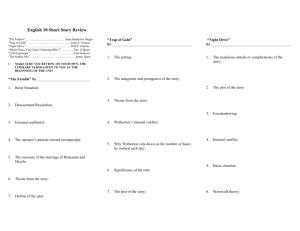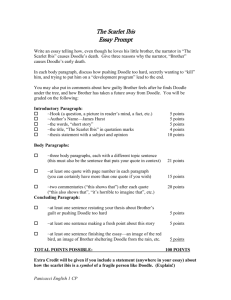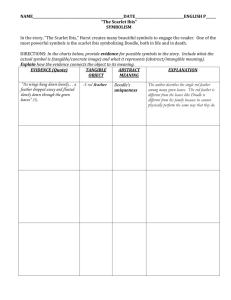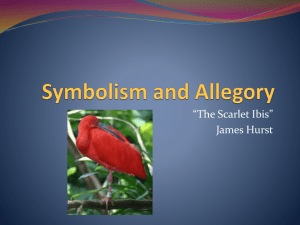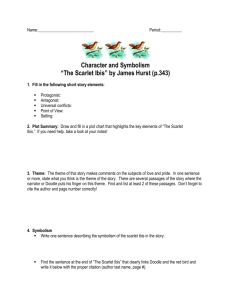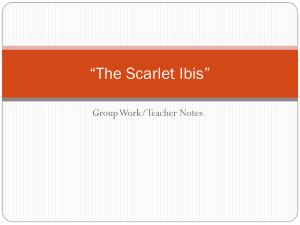Unit 4 The Scarlet Ibis Intro and Dialectical Reading
advertisement
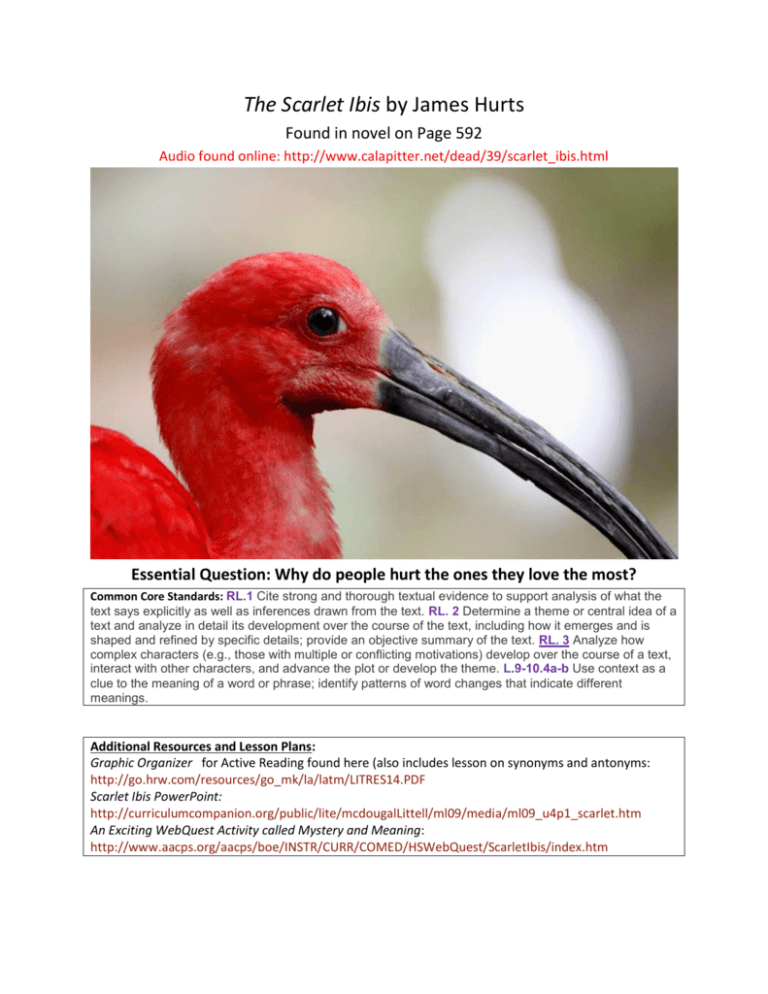
The Scarlet Ibis by James Hurts Found in novel on Page 592 Audio found online: http://www.calapitter.net/dead/39/scarlet_ibis.html Essential Question: Why do people hurt the ones they love the most? Common Core Standards: RL.1 Cite strong and thorough textual evidence to support analysis of what the text says explicitly as well as inferences drawn from the text. RL. 2 Determine a theme or central idea of a text and analyze in detail its development over the course of the text, including how it emerges and is shaped and refined by specific details; provide an objective summary of the text. RL. 3 Analyze how complex characters (e.g., those with multiple or conflicting motivations) develop over the course of a text, interact with other characters, and advance the plot or develop the theme. L.9-10.4a-b Use context as a clue to the meaning of a word or phrase; identify patterns of word changes that indicate different meanings. Additional Resources and Lesson Plans: Graphic Organizer for Active Reading found here (also includes lesson on synonyms and antonyms: http://go.hrw.com/resources/go_mk/la/latm/LITRES14.PDF Scarlet Ibis PowerPoint: http://curriculumcompanion.org/public/lite/mcdougalLittell/ml09/media/ml09_u4p1_scarlet.htm An Exciting WebQuest Activity called Mystery and Meaning: http://www.aacps.org/aacps/boe/INSTR/CURR/COMED/HSWebQuest/ScarletIbis/index.htm Introduction: Sometime we are the cruelest to those we love the most. Adults are better at controlling their emotions, but children often act quickly on their feelings, hurting their loved ones with their words and actions. How do you deal with your emotions? What harm can come from a reckless word or actions? Making the Connection: Why do you think people are the hardest on those they love the most? Discuss this question and list your answers with a small group. Share your answers with the class. How many groups came up with the same answers? Evaluating the Text -Symbols are a literary device and symbols can be people, animals, places, objects, or activities that represent something beyond itself. Authors use symbols to emphasize crucial concepts and characters traits. Symbols can act as clues or hints to the story’s theme. For instance, in the story you will read next, The Scarlet Ibis, the swamp symbolizes the love between two brothers. As you read, try to identify other symbols in the story. Skills for Reading –Inferences are educated guesses based upon what you have read and your prior knowledge or experience. Sometimes inferences are referred to as reading between the lines. Being able to make logical inferences will prove valuable in determining a story’s theme. Vocabulary in Context The following words are critical in understanding the story you’re about to read. Restate each word using a different word in the column next to the first phrase. Vocabulary Word is bolded Exotic trip to Fuji Reiterate the directions for further explanation Evanesce, like a ghost who suddenly disappeared An imminent danger to Homeland security She believed in the infallibility of her talents Studied hard and with doggedness Precariously took risks Many of his unorthodox beliefs were considered heresy What the word means About the Author James Hurst was born in North Carolina. He attended college and served in World War II, and after attended the world famous Juilliard School. There he studied singing and later moved to Rome hoping for a career in the Opera. Later he moved to New York and took a job at a New York bank. He wrote “The Scarlet Ibis” while working at the bank. When he is asked about the meaning of the story he said that is a commentary on the “tenacity and splendor of the human spirit.” The setting for the story is the North Carolina coast and is very important to the story. Hurst uses many of the local plants as symbols in the story. DIALECTICAL JOURNALS The term “Dialectic” means “the art or practice of arriving at the truth by using conversation involving question and answer.” Think of your dialectical journal as a series of conversations with the texts we read during this course. The process is meant to help you develop a better understanding of the texts we read. Use your journal to incorporate your personal responses to the texts, your ideas about the themes we cover and our class discussions. You will find that it is a useful way to process what you’re reading, prepare yourself for group discussion, and gather textual evidence for your Literary Analysis assignments. PROCEDURE: As you read, choose passages that stand out to you and record them in the lefthand column of a T-chart (ALWAYS include page numbers). o In the right column, write your response to the text (ideas/insights, questions, reflections, and comments on each passage) o If you choose, you can label your responses using the following codes: o (Q) Question – ask about something in the passage that is unclear o (C) Connect – make a connection to your life, the world, or another text o (P) Predict – anticipate what will occur based on what’s in the passage o (CL) Clarify – answer earlier questions or confirm/disaffirm a prediction o (R) Reflect – think deeply about what the passage means in a broad sense – not just to the characters in the story. What conclusions can you draw about the world, about human nature, or just the way things work? o (E) Evaluate - make a judgment about the character(s), their actions, or what the author is trying to say o Complete journal entries for at least two passages each week. You can earn up to 25 points per week for your journals. Sample Dialectical Journal entry: THE THINGS THEY CARRIED by Tim O’Brien o Passages from the text “-they carried like freight trains; they carried it on their backs and Pg#s Pg 2 Comments & Questions (R) O’brien chooses to end the first section of the novel with this sentence. He provides excellent visual details of what each shoulders-and for all the ambiguities of Vietnam, all the mysteries and unknowns, there was at least the single abiding certainty that they would never be at a loss for things to carry”. solider in Vietnam would carry for day-to-day fighting. He makes you feel the physical weight of what soldiers have to carry for simple survival. When you combine the emotional weight of loved ones at home, the fear of death, and the responsibility for the men you fight with, with this physical weight, you start to understand what soldiers in Vietnam dealt with every day. This quote sums up the confusion that the men felt about the reasons they were fighting the war, and how they clung to the only certainty - things they had to carry - in a confusing world where normal rules were suspended. CHOOSING PASSAGES FROM THE TEXT: CHOOSING PASSAGES FROM THE TEXT: Look for quotes that seem significant, powerful, thought provoking or puzzling. For example, you might record: o o o o o o o o Effective &/or creative use of stylistic or literary devices Passages that remind you of your own life or something you’ve seen before Structural shifts or turns in the plot A passage that makes you realize something you hadn’t seen before Examples of patterns: recurring images, ideas, colors, symbols or motifs. Passages with confusing language or unfamiliar vocabulary Events you find surprising or confusing Passages that illustrate a particular character or setting RESPONDING TO THE TEXT: You can respond to the text in a variety of ways. The most important thing to remember is that your observations should be specific and detailed. You can write as much as you want for each entry. You can use loose leaf paper for your journals or download the template from the Author Study page on the ESA web site. Basic Responses o Raise questions about the beliefs and values implied in the text o Give your personal reactions to the passage o Discuss the words, ideas, or actions of the author or character(s) o Tell what it reminds you of from your own experiences o Write about what it makes you think or feel o Agree or disagree with a character or the author Sample Sentence Starters: I really don’t understand this because… I really dislike/like this idea because… I think the author is trying to say that… This passage reminds me of a time in my life when… If I were (name of character) at this point I would… This part doesn’t make sense because… This character reminds me of (name of person) because… Higher Level Responses o Analyze the text for use of literary devices (tone, structure, style, imagery) Make connections between different characters or events in the text Make connections to a different text (or film, song, etc…) Discuss the words, ideas, or actions of the author or character(s) Consider an event or description from the perspective of a different character o Analyze a passage and its relationship to the story as a whole Variations on the Dialectical Journal Format o Metacognitive Journal – what I learned/how I figured it out (incl. pg. #s) o Synthesis Journal – at the end of a weekly cycle, consider your Dialectical Journal entries, group work & participation in class discussion. Analyze your overall progress as a reader & writer. o o o o Dialectical Journal Template In this template, two quotes have been added for you. You need to add 5 more. Passage from the text “It was the clove of seasons, summer was dead but autumn had not yet been born, that the ibis lit in the bleeding tree. The flower garden was stained with rotting brown magnolia petals and ironweeks grew rank amid the purple phlox.” “He [Doodle] was born when I was six and was, from the outset, a disappointment. He seemed all head, with a tiny body which was read and shriveled like an old man’s. Everybody thought he was going to die….Daddy had Mr. Heath, the carpenter, build a little mahogany coffin for him. But he didn’t die, and when he was three months old, Mama and Daddy decided that might as well name him.” Pg #s 594 595 Comments and Questions Why does the author start the story out with images of death? Is he foreshadowing that something bad will happen? How did it make the narrator feel when everyone said his brother would die? Did they wait three months to name him in order to not get attached to the baby? Passage from the text Pg #s Comments and Questions The Scarlet Ibis It was in the clove of seasons, summer was dead but autumn had not yet been born, that the ibis lit in the bleeding tree. The flower garden was stained with rotting brown magnolia petals and ironweeds grew rank amid the purple phlox. The five o'clocks by the chimney still marked time, but the oriole nest in the elm was untenanted and rocked back and forth like an empty cradle. The last graveyard flowers were blooming, and their smell drifted across the cotton field and through every room of our house, speaking softly the names of our dead. It's strange hat all this is still so clear to me, now that that summer has since fled and time has had its way. A grindstone stands where the bleeding tree stood, just outside the kitchen door, and now if an oriole sings in the elm, its song seems to die up in the leaves, a silvery dust. But sometimes (like right now), as I sit in the cool, green-draped parlor, the grindstone begins to turn, and time with all its changes is ground away--and I remember Doodle. Doodle was just about the craziest brother a boy ever had. Of course, he wasn't a crazy crazy like old Miss Leedie, who was in love with President Wilson and wrote him a letter every day, but was a nice crazy, like someone you meet in your dreams. He was born when I as six and was, from the outset, a disappointment. He seemed all head, with a tiny body which was red and shriveled like an old man's. Everybody thought he was going to die. Daddy had Mr. Heath, the carpenter, build a little mahogany coffin for him. But he didn't die, and when he was three months old, Mama and Daddy decided they might as well name him. They named him William Armstrong, which was like tying a big tail on a small kite. Such a name sounds good only on a tombstone. I thought myself pretty smart at many things, like holding my breath, running, jumping, or climbing the vines in Old Woman Swamp, and I wanted more than anything else someone to box with, and someone to perch with in the top fork of the great pine behind the barn, where across the fields and swamps you could see the sea. But Mama, crying, told me that even if William Armstrong lived, he would never do these things with me. He might not, she sobbed, even be "all there." It was bad enough having an invalid brother, but having one who possibly was not all there was unbearable, so began to make plans to kill him by smothering him with a pillow. However, one afternoon as I watched him, my head poked between the iron posts of the foot of the bed, he looked straight at me and grinned. I skipped through the rooms, down the echoing halls, shouting, "Mama, he smiled. he's all there! He's all there!" and he was. As long as he lay all the time in bed, we called him William Armstrong, even though it was formal and sounded as if we were referring to one of our ancestors, but with his creeping around on the deerskin rug and beginning to talk, something had to be done about his name. It was I who renamed him. When he crawled, he crawled backwards, as if he were in reverse and couldn't change gears. If you called him, he'd turn around as if he were going in the other direction, then he'd back right up to you to be picked up. Crawling backward made him look like a doodlebug, so I began to call him Doodle, and in time even Mama and Daddy thought it was a better name than William Armstrong. Yes. Renaming my brother was perhaps the kindest thing I ever did for him, because nobody expects much for someone called Doodle. Although Doodle learned to crawl, he showed no signs of walking, but he wasn't idle. He talked so much that we all quit listening to what he said. It was about this time that Daddy built him a go-cart and I had to pull him around. If I so much as picked up my cap, he's start crying to go with me and Mama would call from wherever she was, "Take Doodle with you." He was a burden in many ways. The doctor had said that he mustn't get too excited, too hot, too cold, or too tired and that he must always be treated gently. A long list of don'ts went with him, all of which I ignored once we got out of the house. His skin was very sensitive, and he had to wear a big straw hat whenever he went out. When the going got rough and he had to climb to the sides of the go-cart, the hat slipped all the way down over his ears. He was a sight. Finally, I could see I was licked. Doodle was my brother and he was going to cling to me forever, no matter what I did, so I dragged him across the burning cotton field to share with him the only beauty I knew, Old Woman Swamp. His eyes were round with wonder as he gazed about him, and his little hands began to stroke the rubber grass. Then he began to cry. "For heaven's sake, what's the matter?" I asked, annoyed. "It's so pretty," he said. "So pretty, pretty, pretty." After that day Doodle and I often went down into Old Woman Swamp. There is within me (and with sadness I have watched it in others) a knot of cruelty borne by the stream of love, much as our blood sometimes bears the seed of our destruction, and at times I was mean to Doodle. One day I took him up to the barn loft and showed him his casket, telling him now we all had believed he would die. It was covered with a film of Paris green sprinkled to kill the rats, and screech owls had built a nest inside it. Doodle studied the mahogany box for a long time, then said, "It's not mine." "It is," I said. "And before I'll help you down from the loft, you're going to have to touch it." "I won't touch it," he said sullenly. "Then I'll leave you here by yourself," I threatened, and made as if I were going down. Doodle was frightened of being left. "Don't go leave me, Brother," he cried, and he leaned toward the coffin. His hand, trembling, reached out, and when he touched the casket he screamed. A screech owl flapped out of the box into our faces, scaring us and covering us with Paris green. Doodle was paralyzed, so I put him on my shoulder and carried him down the ladder, and even when we were outside in the bright sunshine, he clung to me, crying. "Don't leave me. Don't leave me." When Doodle was five years old, I was embarrassed at having a brother of that age who couldn't walk, so I set out to teach him. We were down in Old Woman Swamp and it was spring and the sick-sweet smell of bay flowers hung everywhere like a mournful song. "I'm going to teach you to walk, Doodle," I said. "I can't walk, Brother," he said. "Who says so?" I demanded. "Mama, the doctor--everybody." "Oh, you can walk," I said, and I took him by the arms and stood him up. He collapsed onto the grass like a half empty flour sack. It was as if he had no bones in his little legs. "I'm going to teach you to walk." It seemed so hopeless from the beginning that it's a miracle I didn't give up. But all of us must have something or someone to be proud of, and Doodle had become mine. I did not know then that pride is a wonderful, terrible thing, a seed that bears two vines, life and death. Every day that summer we went to the pine beside the stream of Old Woman Swamp, and I put him on his feet at least a hundred times each afternoon. Occasionally I too became discouraged because it didn't seem as if he was trying, and I would say, "Doodle, don't you want to earn to walk?" He'd nod his head, and I'd say, "Well, if you don't keep trying, you'll never learn." Then I'd paint for him a picture of us as old men, white-haired, him with a long white beard and me still pulling him around in the go-cart. This never failed to make him try again. Finally one day, after many weeks of practicing, he stood alone for a few seconds. When he fell, I grabbed him in my arms and hugged him, our laughter pealing through the swamp like a ringing bell. Now we know it could be done. Hope no longer hid in the dark palmetto thicket but perched like a cardinal in the lacy toothbrush tree, brilliantly visible. "Yes, yes," I cried, and he cried it too, and the grass beneath us was soft and the smell of the swamp was sweet. At breakfast on our chosen day, when Mama, Daddy, and Aunt Nicey were in the dining room, I brought Doodle to the door in the go-cart just as usual and head them turn their backs, making them cross their hearts and hope to die if they peeked. I helped Doodle up, and when he was standing alone I let them look. There wasn't a sound as Doodle walked slowly across the room and sat down at his place at the table. Then Mama began to cry and ran over to him, hugging him and kissing him. Daddy hugged him too, so I went to Aunt Nicey, who was thanks praying in the doorway, and began to waltz her around. We danced together quite well until she came down on my big toe with her brogans, hurting me so badly I thought I was crippled for life. Doodle told them it was I who had taught him to walk, so everyone wanted to hug me, and I began to cry. They did not know that I did it for myself; that pride, whose slave I was, spoke to me louder than all their voices, and that Doodle walked only because I was ashamed of having a crippled brother. Within a few months, Doodle had learned to walk well and his go-cart was put up in the barn loft (it is still there) beside his little mahogany coffin. Once I had succeeded in teaching Doodle to walk, I began to believe in my own infallibility, and I prepared a terrific development program for him, unknown to Mama and Daddy, of course. I would teach him to run, to swim, to climb trees, and to fight. He, too, now believed in my infallibility, so we set the deadline for these accomplishments less than a year away, when, it had been decided, Doodle could start school. On hot days, Doodle and I went down to Horsehead Landing, and I gave him swimming lessons or showed him how to row a boat. Sometimes we descended into the cool greenness of Old Woman Swamp and climbed the rope vines or boxed scientifically beneath the pine where he had learned to walk. Promise hung about us like the leaves, and wherever we looked, ferns unfurled and birds broke into song. So we came to that clove of seasons. School was only a few weeks away, and Doodle was far behind schedule. He could barely clear the ground when climbing up the rope vines, and his swimming was certainly not passable. We decided to double our efforts, to make that last drive and reach our pot of gold. I made him swim until he turned red and his eyes became glazed. Once, he could go no further, so he collapsed on the ground and began to cry. "Aw, come on, Doodle," I urged. "You can do it. Do you want to be different from everybody else when you start school?" "Does it make any difference?" "It certainly does," I said. "Now, come on," and I helped him up. As we slipped through dog days, Doodle began to look feverish, and Mama felt his forehead, asking him if he felt ill. At night he didn't sleep well, and sometimes he had nightmares, crying out until I touched him and said, "Wake up, Doodle. Wake up." It was Saturday noon, just a few days before school was to start. I should have already admitted defeat, but my pride wouldn't let me. The excitement of our program had now been gone for weeks, but still we kept on with a tired doggedness. It was too late to turn back, for we had both wandered too far into a net of expectations and had left no crumbs behind. Daddy, Mama, Doodle, and I were seated at the dining-room table having lunch. It was a hot day, with all the windows and doors open in case a breeze should come. In the kitchen Aunt Nicey was humming softly. Suddenly, from out in the yard, came a strange croaking noise. Doodle stopped eating, with a piece of bread poised ready for his mouth, his eyes popped round like two blue buttons. "What's that?" he whispered. I jumped up, knocking over my chair, and had reached the door when Mama called, "Pick up the chair, sit down again, and say excuse me." By the time I had done this, Doodle had excused himself and had slipped out into the yard. He was looking up into the bleeding tree. "It's a great big red bird!" he called. The bird croaked loudly again, and Mama and Daddy came out into the yard. We shaded our eyes with our hands against the hazy glare of the sun and peered up through the still leaves. On the topmost branch a bird the size of a chicken, with scarlet feathers and long legs, was precariously. Its wings hung down loosely, and as we watched, a feather dropped away and floated slowly down through the green leaves. Doodle's hands were clasped at his throat, and I had never seen him stand still so long. "What is it?" he asked. At that moment the bird began to flutter, but the wings were uncoordinated, and amid much flapping and a spray of flying feathers, it tumbled down, bumping through the limbs of the bleeding tree and landing at our feet with a thud. Its long, graceful neck jerked twice into an S, then straightened out, and the bird was still. A white veil came over the eyes and the long white beak unhinged. Its legs were crossed and its clawlike feet were delicately curved at rest. Even death did not mar its grace, for it lay on the earth like a broken vase of red flowers, and we stood around it, awed by its exotic beauty. "Go bring me the bird book," said Daddy. I ran into the house and brought back the bird book. As we watched, Daddy thumbed through its pages. "It's a scarlet ibis," he said, pointing to a picture. "It lives in the tropics--South America to Florida. A storm must have brought it here." Sadly, we all looked back at the bird. A scarlet ibis! How many miles it had traveled to die like this, in our yard, beneath the bleeding tree. "Dead birds is bad luck," said Aunt Nicey, poking her head from the kitchen door. "Specially red dead birds!" As soon as I had finished eating, Doodle and I hurried off to Horsehead Landing. Time was short, and Doodle still had a long way to go if he was going to keep up with the other boys when he started school. The sun, gilded with the yellow cast of autumn, still burned fiercely, but the dark green woods through which we passed were shady and cool. When we reached the landing, Doodle said he was too tired to swim, so we got into a skiff and floated down the creek with the tide. Doodle did not speak and kept his head turned away, letting one hand trail limply in the water. After we had drifted a long way, I put the oars in place and made Doodle row back against the tide. Black clouds began to gather in the southwest, and he kept watching them, trying to pull the oars a little faster. When we reached Horsehead Landing, lightning was playing across half the sky and thunder roared out, hiding even the sound of the sea. The sun disappeared and darkness descended. Doodle was both tired and frightened, and when he stepped from the skiff he collapsed onto the mud, sending an armada of fiddler crabs rustling off into the marsh grass. I helped him up, and as he wiped the mud off his trousers, he smiled at me ashamedly. He had failed and we both knew it, so we started back home, racing the storm. The lightening was near now, and from fear he walked so close behind me he kept stepping on my heels. The faster I walked, the faster he walked, so I began to run. The rain was coming, roaring through the pines, and then, like a bursting Roman candle, a gum tree ahead of us was shattered by a bolt of lightning. When the deafening peal of thunder had died, and in the moment before the rain arrived, I heard Doodle, who had fallen behind, cry out, "Brother, Brother, don't leave me! Don't leave me!" The knowledge that Doodle's and my plans had come to naught was bitter, and that streak of cruelty within me awakened. I ran as fast as I could, leaving him far behind with a wall of rain dividing us. The drops stung my face like nettles, and the wind flared the wet glistening leaves of the bordering trees. Soon I could hear his voice no more. I hadn't run too far before I became tired, and the flood of childish spite evanesced as well. I stopped and waited for Doodle. The sound of rain was everywhere, but the wind had died and it fell straight down in parallel paths like ropes hanging from the sky. As I waited, I peered through the downpour, but no one came. Finally I went back and found him huddled beneath a red nightshade bush beside the road. He was sitting on the ground, his face buried in his arms, which were resting on his drawnup knees. "Let's go, Doodle," I said. He didn't answer, so I placed my hand on his forehead and lifted his head. Limply, he fell backwards onto the earth. He had been bleeding from the mouth, and his neck and the front of his shirt were stained a brilliant red. Doodle! Doodle! I cried, shaking him, but there was no answer but the ropy rain. He say very awkwardly, with his head thrown far back, making his vermilion neck appear unusually long and slim. His little legs, bent sharply at the knees, had never before seemed so fragile, so thin. I began to weep, and the tear-blurred vision in red before me looked very familiar. "Doodle!" I screamed above the pounding storm and threw my body to the earth above his. For a long time, it seemed forever, I lay there crying, sheltering my fallen scarlet ibis from the heresy of rain.

